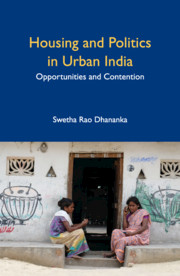Book contents
- Frontmatter
- Dedication
- Contents
- List of Figures
- List of Tables and Box
- Acknowledgements
- List of Abbreviations
- 1 Claiming Adequate Housing in Urban India: An Introduction
- 2 Indian Democracy: Normative Prescriptions and Everyday Practices
- 3 Governmentality of Housing and the Politics of Access
- 4 Mobilization on Behalf of the Urban Poor
- 5 Mobilizations by the Urban Poor
- 6 Claiming Housing despite Indian Politics and Governance
- Epilogue
- Bibliography
- Index
4 - Mobilization on Behalf of the Urban Poor
Published online by Cambridge University Press: 30 April 2020
- Frontmatter
- Dedication
- Contents
- List of Figures
- List of Tables and Box
- Acknowledgements
- List of Abbreviations
- 1 Claiming Adequate Housing in Urban India: An Introduction
- 2 Indian Democracy: Normative Prescriptions and Everyday Practices
- 3 Governmentality of Housing and the Politics of Access
- 4 Mobilization on Behalf of the Urban Poor
- 5 Mobilizations by the Urban Poor
- 6 Claiming Housing despite Indian Politics and Governance
- Epilogue
- Bibliography
- Index
Summary
Who mobilized on behalf of the urban poor on the issue of adequate housing? Why and how would they do it? What would the rationale be? Within the Basic Services for the Urban Poor (BSUP) component of the Jawaharlal Nehru National Urban Renewal Mission (JNNURM), a role was foreseen for elite society organizations. How would they live up to it? The policy assumed that slum communities lacked skills and resources to be the interlocutors for the implementation of the housing policy and envisaged a critical role for civil society organizations. The toolkit suggested that civil society organizations could play a critical role in facilitating communities to come together. Hence it is not the local authority providing for capacity building, but rather civil society organizations that were expected to cooperate in this mission and act as brokers between the policy beneficiaries and the implementing agency.
Housing was indeed a domain in which civil society organizations hardly engaged because of the contested nature of urban land and space and the high funding and expertise required (Sen 1998). Most of the city's civil society organization listings did not even include housing as a category. Since the initial days of embarking on to this research endeavour with a clear organizational focus, I closely watched the press and a preparatory fieldwork phase helped to grasp ‘low-intensity thermodynamics’ of the housing domain and its actors. I had identified two organizations of interest.
I met my interviewee of the first organization at a junction in a rather well-to-do neighbourhood. The junction framed a little triangular patch of land, which was bordered with homes made of low-quality materials with tarpaulin roofs. Amidst this patch of self-constructed homes rose a three-storeyed concrete structure. This was one of the first BSUP project sites underway in Bangalore at the time of my fieldwork. My interlocutor was one of the project coordinators for the elite society organization called CIVIC. CIVIC was one of the oldest civil society organizations in Bangalore, which had made its name in organizing citizen consultations and raising awareness on urban governance issues. She held a degree in social work and was specialized in the domain of health. She came here once a week to visit the community of around 112 families.
- Type
- Chapter
- Information
- Housing and Politics in Urban IndiaOpportunities and Contention, pp. 96 - 127Publisher: Cambridge University PressPrint publication year: 2020



